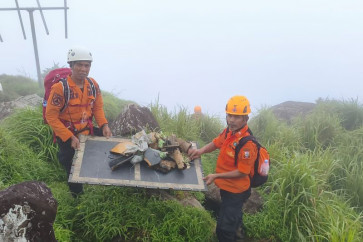Popular Reads
Top Results
Can't find what you're looking for?
View all search resultsPopular Reads
Top Results
Can't find what you're looking for?
View all search resultsNew chapter of ERP: City to retender procurement
Touted as an answer to Jakarta’s traffic woes, the development of the long-delayed electronic road pricing (ERP) scheme hit a setback after the Jakarta administration announced plans to reopen tenders for procurement
Change text size
Gift Premium Articles
to Anyone
T
outed as an answer to Jakarta’s traffic woes, the development of the long-delayed electronic road pricing (ERP) scheme hit a setback after the Jakarta administration announced plans to reopen tenders for procurement.
The plan was made because of a legal opinion from the Attorney General’s Office (AGO) that reportedly suggested the administration to do so.
“We will do the tender process again in the near future,” Jakarta Transportation Agency head Syafrin Liputo told The Jakarta Post on Wednesday.
He said the AGO’s recommendation stated that the “mechanism in the [previous] tender process is not in accord with requirements”.
The AGO also recommended the administration review the documents for the tender, which is to be conducted by the agency next year, thus the ERP was expected to be implemented in 2021, he said.
Due to the halted process, the agency has scrapped a total of Rp 39.3 billion [US$2.75 million] from this year’s city budget that was to be allocated to the ERP management unit (UP SJBE).
“We will propose [funding] in accordance with our needs in the 2020 city budget,” Syafrin added.
Jakarta Governor Anies Baswedan said the administration would consult with the information application directorate general at the Information and Communications Ministry in an attempt to use a “more advanced technology” for road pricing.
“Hence, [it would] not only manage one or two roads but [act] as an integrated system between privately owned vehicles and public transportation,” he said recently without elaborating.
Anies recently issued a 2019 gubernatorial instruction on measures his administration would take regarding air pollution, which include stipulations for the Transportation Agency to prepare a bylaw on “congestion pricing” policy by 2020 and to implement the scheme by 2021.
The ERP was first proposed to the administration in May 2005 to overcome gridlocks in the capital that has been touted as the city with the worst traffic congestion in the world.
In 2007, then-governor Sutiyoso said the system would be a suitable replacement for the three-in-one car sharing policy deemed ineffective for easing congestion.
During the tenure of then-governor Fauzi Bowo, several technology companies expressed interest in implementing the idea.
After more than a decade of planning and multiple changes to Jakarta’s leadership, the scheme has yet to come to fruition, mainly because of legal issues.
In 2014, the city conducted an ERP trial on Jl. Sudirman and Jl. Thamrin in Central Jakarta using technology supplied by Sweden-based Kapsch TrafficCom and on Jl. HR Rasuna Said in South Jakarta by Norway-based Q-Free in order to prove the proposed technology functioned well.
The administration called for ERP tenders in 2016.
However, the Business Competition Supervisory Commission (KPPU) criticized Gubernatorial Regulation No. 149/2016 on traffic control, saying it was monopolistic for specifying the use of only one type of ERP technology. A new gubernatorial regulation on ERP was issued in 2017 to replace it.
The city planned to conduct another trial run of the ERP system and aimed to implement it last year while at the same time deliberating the legal basis to allow implementation of the system.
Anies said he consulted with the AGO in November 2018, asking for a legal opinion because of the alleged maladministration that occurred during the tender process, without providing details on what exactly had gone wrong.
The two foreign firms that were prequalified as potential vendors, Q-Free and Kapsch TrafficCom, withdrew from the tender process, leaving Indonesian company PT Bali Towerindo Sentra the only remaining potential vendor.
Q-Free said in a statement that its decision to withdraw “is a consequence of the continued uncertainty regarding the tendering timeline, project structure and financing and project profitability”.
Jakarta currently enforces odd-even license plate traffic regulations on 25 major thoroughfares in the morning and evening to limit the use of private vehicles. They are being applied to compensate for delays in the ERP scheme.
A transportation expert from the University of Indonesia (UI), Ellen Tangkudung, demanded further explanations about the type of technology the administration wants to apply.
She expressed a belief that the new bidding process would require a long time, further delaying the project, amid the urgency the city has to implement more reliable traffic control policies.
“Applying a more advanced technology is very idealistic. Somehow I agree with that, but has [the technology been] proven in other cities? Do you want Jakarta to become a trial place?” she asked.
The technology-based system would be more effective, provide accurate results and it has been proven in other cities, as compared to the current odd-even regulations that rely on manpower to enforce them, she said.
“Traffic restraint using ERP is more beneficial. The money gained from the scheme is to be allocated to improve public transportation, hence encourage people to switch [from private vehicles],” she said.
A public policy expert from UI, Agus Pambagio, said the underlying problem for the delays was the lack of good intentions by the administration to support the implementation of ERP.
With the long-delayed tender process, undoubtedly illustrating legal uncertainty in the eyes of business entities, he doubted the new tendering would be a success.
“[The delayed ERP] has harmed society and disappointed the involved system providers,” he said.
The administration must open a new tender with stricter requirements and monitoring in order to get a reliable tender winner, he suggested.
“The [mindset] should be program-oriented, not project-oriented” to make the process success, he said.









